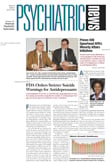Eli Lilly and Co., working with regulators in several countries, has warned physicians that its best-selling antipsychotic medication olanzapine (Zyprexa) appears to be associated with a threefold increase in risk of cerebrovascular accidents (CVAs) in elderly patients with dementia.
In April 2003 Janssen Pharmaceutica issued a similar warning for its popular antipsychotic risperidone (Risperdal).
Researchers do not have a clear understanding of what mechanism may be underlying the link between these medications and increased risk of CVAs. Some psychopharmacologists have postulated, however, that the link could be due to both drugs’ effects on serotonin. Serotonin has long been known to be active in blood-vessel constriction and dilation. However, no research has been published that clarifies the link.
Neither of the two second-generation antipsychotics is indicated for the treatment of behavioral disturbances in elderly patients suffering from dementia; however, both are commonly prescribed off label to calm aggression and agitation, as well as dementia-related psychosis in elderly, institutionalized patients.
The new olanzapine warning is the result of a pooled analysis of five clinical trials of the drug in elderly patients who have psychosis related to Alzheimer’s disease, vascular dementia, or mixed dementia. The efficacy of olanzapine was not established in these trials.
In all, 15 patients of the 1,178 randomly assigned in the trials to receive olanzapine suffered CVAs (1.3 percent), compared with two patients out of the 478 randomly assigned to placebo (0.4 percent). This finding represents just over a threefold increase in CVA risk. For the subgroup of patients who had vascular dementia, there was a five-fold higher likelihood of experiencing a CVA. In all, four patients died while taking olanzapine, compared with one on placebo.
In consultation with the U.S. Food and Drug Administration, Lilly has added the following warning language to the Zyprexa label:
“Cerebrovascular Adverse Events, Including Stroke, in Elderly Patients with Dementia
“Cerebrovascular adverse events (e.g., stroke, transient ischemic attack), including fatalities, were reported in patients in trials of olanzapine in elderly patients with dementia-related psychosis. In placebo-controlled trials, there was a significantly higher incidence of cerebrovascular adverse events in patients treated with olanzapine compared with patients treated with placebo. Olanzapine is not approved for the treatment of patients with dementia-related psychosis.”
Updated safety information for olanzapine is posted online at www.zyprexa.com/common_pages/hcp_safety.jsp. ▪
